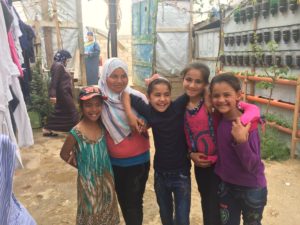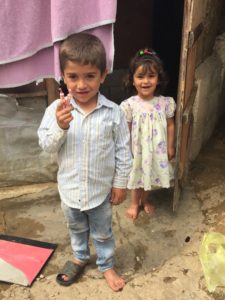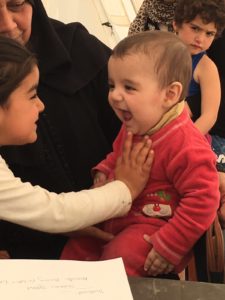 Provide medical treatment, surgery, services to displaced refugees
Provide medical treatment, surgery, services to displaced refugees
By Dee Longfellow
For The Elmhurst Independent
When we see images of children injured in the war in Syria or displaced to refugee camps in neighboring countries, it’s too easy to feel a moment of sympathy and then, go on to the next news story.
It’s quite a different matter when you’ve met these families, worked with them and helped restore their health.
Those were the feelings of three medical professionals from Elmhurst Memorial Hospital who recently visited Lebanon to bring medical supplies and assistance to the war-torn country.
The Independent had a chance to sit down with Dr. Michael Martirano, a general surgeon; his wife, Beth Martirano, who is an RN; and, Jennifer Lukas, also an RN.
The April mission to Lebanon was sponsored by the Syrian American Medical Society (SAMS), which pays for rental use of special medical equipment (such as a laser machine) and provides space for treating patients. Volunteer doctors and nurses cover their own transportation and lodging.
Elmhurst Hospital has contributed $5,000 toward medication, surgery and catheterization lab expenses, a sum that’s being matched by its medical staff.
“We’re glad to help defray the mission’s medical care expenses,” said Pamela Dunley, president & CEO, Elmhurst Hospital. “And we’re offering paid time off for the Elmhurst nurses who are part of the group. We want to support the volunteer causes of our physicians and other staff.”
 Largest number of displaced people
Largest number of displaced people
“Syria has the largest displacement of refugees in the world right now,” said Dr. Martirano. “More than 6 million have been displaced throughout the area in Turkey, Jordan, Greece and Lebanon. Lebanon has 1.5 million refugees and there are only 4 million people in total in the country. Patients do not have access to healthcare and the government can’t support all these people. That’s why SAMS is helping to offset costs and providing care in the operating room, camps, medical, dental, all kinds of things.”
“If a Syrian refugee has an emergency, they may go to the hospital, but unless it’s a dire emergency, they will have to wait,” said Lukas. “Even in an emergency, they may be treated but they are expected to pay money.”
“Syria was not an impoverished country,” Dr. Martirano said. “People worked, they were well-educated, they had good lives with homes, careers, art and culture. Then came ‘The Crisis,’ as they call it. Suddenly people were being murdered. Family members were lost in the war.
“While we didn’t see the actual shooting, we saw the aftermath, all the injuries.”
The group split their time between the cities of Bekaa, Tripoli and Beirut in Lebanon. Bekaa had refugee camps, where there were hospitals and support for surgeries.
Practicing their craft in different circumstances
What was it like when they first got there?
“The first day we did a triage, some of us went to camps, others did the same thing in Beirut. The rest of the time, we were operating or monitoring patients. A lot of these patients showed up thinking they would have to wait until the next mission, but we were able to help a great many people.”
“I didn’t realize how much was going on,” said Beth Martirano. “We watched a documentary. It was interesting just hearing their stories.”
“I thought the camps might be a little better,” said Lukas. “I didn’t realize the depth of the horror. There was no running water, there was access to water but no plumbing. We could get water for a shower or sink, but there were no flush toilets.”
“There are so many things we take for granted here that are simply not that easy over there,” said Dr. Martirano. “Washing your hands before surgery is a standard thing, but it’s much more difficult without running water.”
“Some of the people who came to the camps simply needed showers, a luxury we didn’t have there,” added Lukas.
 Different people, different cultures…
Different people, different cultures…
“It’s heart-breaking because it is very embarrassing to them,” Martirano said. “All the people who came in looked as nice as they possibly could under the circumstances. You could tell they tried to look their best.”
“I noticed people looked older than they were,” said Lukas. “I learned you can’t get hung up on one person’s sad story because, well, they’re all sad stories.
“You don’t want to feel sorry for them. They don’t want us to feel sorry for them.”
“After a few days of seeing how much the medical personnel cared and how hard they worked, the refugees were very appreciative and grateful, when at first, they were a little apprehensive,” said Dr. Martirano. “They wanted us to break bread with them, they believe that eating together brings people closer. We brought in baklava and they were delighted.
“Once we had a meal with them, they were more trusting. Otherwise, they see people come and go all the time and it’s hard to trust people.”
The people of Lebanon love their country and want to go back to their homes, according to Dr. Martirano. He said more than anything, the people want to go back and live like they did before “The Crisis.”
“Some invited us to their homes for tea,” said Lukas. “They were proud people, very proud of their homes, even their tents. They made decorations and did their best, considering there were sometimes as many as ten people in a 10’X10’ room.”
Would they go back again? Absolutely!
If they had to do it over — and all three said they would in a heartbeat — they were asked what they might do differently.
“I’d absolutely go back, it was the greatest thing I’ve ever done in my nursing career,” said Lukas.
“I definitely got more than I gave,” said Beth.
“I’d try to bring more supplies,” said Lukas. “They just need everything, supplies are so limited there. They need things like vitamins, Tylenol and Advil, inhalers, blood supplies. Someone donated thousands of toothbrushes.
“That’s the sad thing, they have toothbrushes, they will brush their teeth, but there are no dentists to provide care. The dentists that went over on the mission went above and beyond the call.”
Other things they needed, according to Lukas, were bandages, lotions, shampoos, soaps, sunscreen, hydrocortisone cream.
A final word…
Dr. Martirano offered the final comment about the experience.
“The one thing I learned was that the whole thing wasn’t about religion, race or politics, it was about helping people,” he said. “We went to help people, and that’s what we did. We had no agenda, no politics.
“We came back knowing we did the right thing, we did a good thing.”
Sample blog post from the doctors who visited Lebanon
The medical staff from Elmhurst Hospital who went to Lebanon kept a blog. Following
is just one interesting excerpt:
“As expected, this past week has been an awakening of sorts. I’ve been managing complex medical issues for refugees; I’ve also been managing my own feelings of guilt knowing that at the end of this week I return to my comfortable home. Ironically, the patients I’ve treated are so much closer to their homeland than me, but they won’t be able to go home for a much, much longer stretch.
“Today in the camps I was asked to see a 6 month old baby boy with fevers. My colleague Elaine Spirakes examined his brother who was only a year older. Both of us were anxious about our evaluations, relying more on our experiences as mothers than doctors — we last saw pediatric patients many years ago in medical school.
“The babies’ parents smiled reassuringly at us, as it seemed they trusted our medical opinions more than we did. My ever-patient translator Kenan Alhayek also helped alleviate my stress given that his top notch translation skills made it seem that I was speaking directly to the baby’s parents without a language barrier.
“I held the baby’s tiny body, and my mind wandered off to my own experience as a mother of a sick 6 month old. I remember sitting in Uzma Mohsin Muneer’s office, frantically explaining details of my daughters fever to her.
“I remember the urgency and fear of having a sick baby who couldn’t communicate with me. I remember praying that her recovery would be quick so that she would feel better sooner.
“It is a true injustice that any parent should have to experience these anxieties with the additional stress of having limited running water, plumbing, electricity, and financial resources to get help.
“In that moment, my heart connected with these young parents who are trying their best to provide for their children when every possible obstacle has been put up to prevent them from doing so.
“Please don’t forget the Syrian refugees and other vulnerable populations around the world.”
A medical trip to Lebanon by the numbers…
While in Lebanon, the Elmhurst Hospital staff performed:
1,559: total beneficiaries treated
197: surgeries
1,343: consultations
23: urology surgeries
19: general surgeries
120: ENT surgeries
62: cardiography tests
19: GI endoscopies
2: bronchoscopy procedures
750: internal and family medicine consultations
85: endocrinology consultations
60: urology consultations
37: GI consultations
52: general surgery consultations
49: pulmonary consultations
30: vascular surgery consultations
275: ENT consultations
